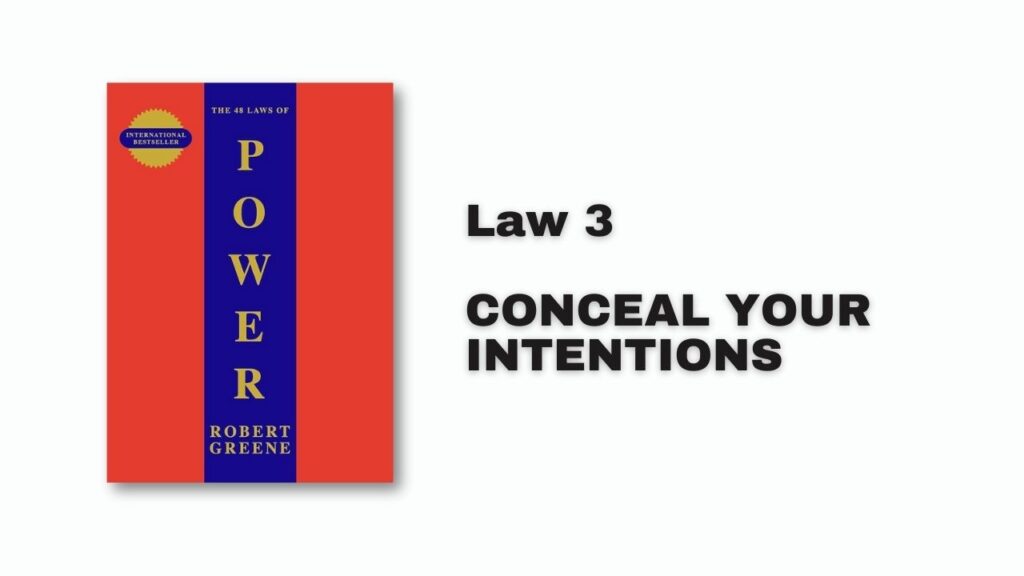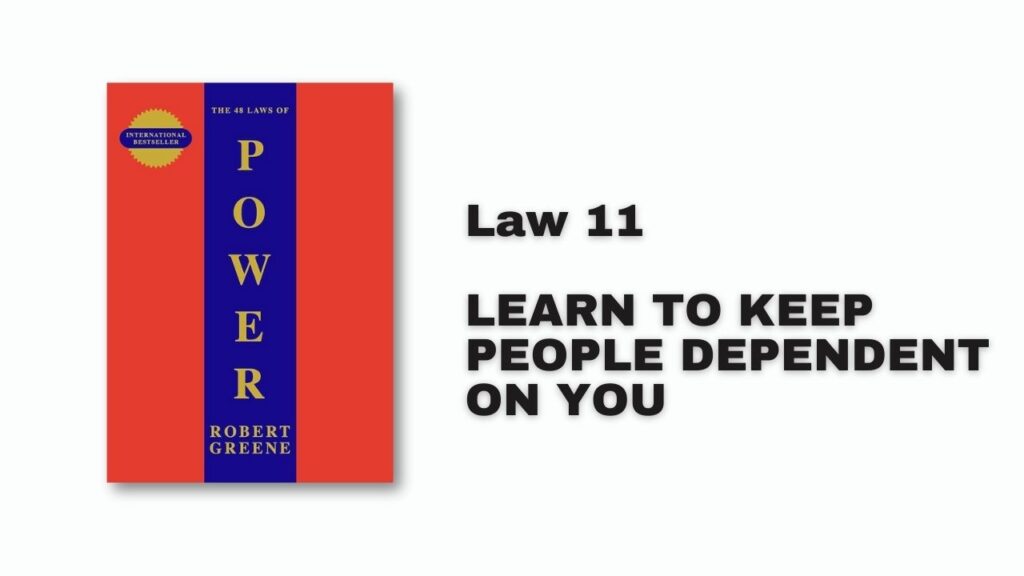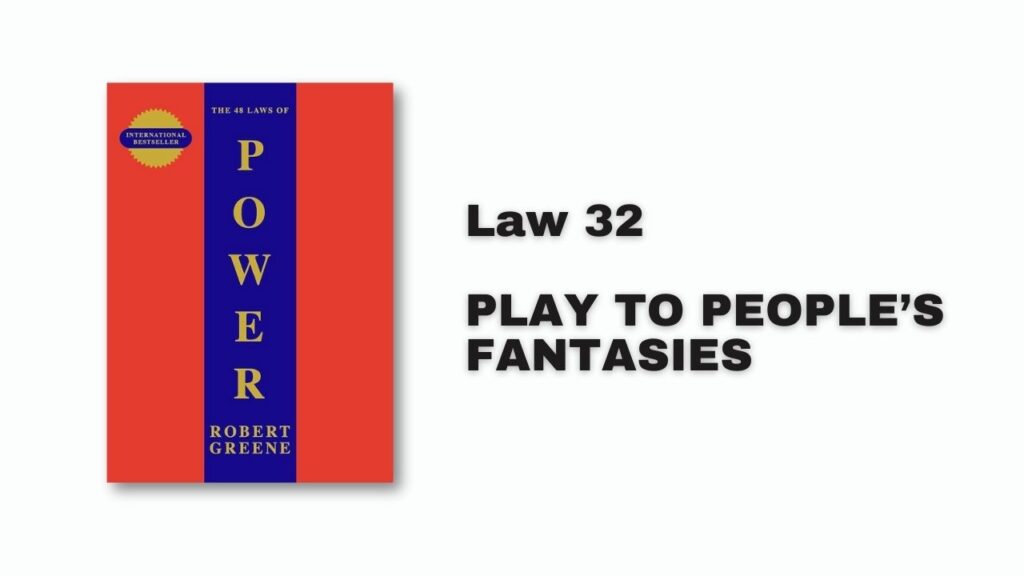Listen in Audio Format
“The 48 Laws of Power” by Robert Greene is a powerful and controversial guide to understanding and mastering the dynamics of power. The book draws on historical examples, psychological insights, and strategic principles to teach readers how to navigate the complexities of power in various situations.
Introduction: Understanding Power

Power is an essential aspect of human relationships, whether in politics, business, or personal life. Greene argues that understanding how power works—and how to use it effectively—can help you achieve your goals and protect yourself from being manipulated by others.
The book provides 48 laws that serve as strategies for gaining, maintaining, and protecting power. These laws are drawn from historical figures, classic literature, and real-world examples.
Law 1: Never Outshine the Master

Always make those above you feel superior. If you make them feel insecure or overshadowed, they might seek to undermine or get rid of you.
For example, when working under a boss, highlight their strengths and give them credit for your achievements. This way, they’ll feel secure and won’t see you as a threat.
Law 2: Never Put Too Much Trust in Friends; Learn How to Use Enemies

Friends can betray you out of envy, but former enemies often make more reliable allies because they have something to prove. Use your enemies strategically.
For example, If you’re in a competitive situation, consider aligning with a former rival. They may be more loyal than a friend who feels entitled to your favor.
Law 3: Conceal Your Intentions

Keep your plans and intentions hidden from others. By keeping people guessing, you maintain control over situations and can surprise your opponents.
For example, If you’re negotiating a deal, don’t reveal your true goals upfront. Let the other party reveal their hand first, giving you an advantage.
Law 4: Always Say Less Than Necessary

The more you speak, the more likely you are to say something foolish or give away too much information. Be concise and let your words carry more weight.
For example, In a meeting, say only what’s needed to make your point. This will make you seem more authoritative and thoughtful.
Law 5: So Much Depends on Reputation – Guard It with Your Life

Your reputation is one of your most valuable assets. Protect it at all costs, and use it to strike fear in your enemies and impress others.
For example, If someone tries to tarnish your reputation, respond swiftly and decisively to set the record straight and prevent further damage.
Law 6: Court Attention at All Costs

Being noticed and recognized is crucial for gaining power. Even negative attention can be better than being ignored. Stand out from the crowd.
For example, If you’re in a competitive environment, find ways to differentiate yourself—whether through your work, appearance, or behavior—to attract attention.
Law 7: Get Others to Do the Work for You, but Always Take the Credit

Use the skills and efforts of others to advance your own goals, while making sure you receive the recognition and benefits.
For example, Delegate tasks to capable team members, but ensure that your role as the leader is clear when the project succeeds.
Law 8: Make Other People Come to You – Use Bait If Necessary

Draw people toward you by offering something they want, rather than chasing after them. This gives you control over the situation.
For example, If you want to negotiate a better deal, create a situation where the other party needs you more than you need them.
Law 9: Win Through Your Actions, Never Through Argument

Actions are more powerful and convincing than words. Avoid unnecessary arguments, and let your success speak for itself.
For example, Instead of debating a point endlessly, demonstrate your expertise or capabilities through tangible results.
Law 10: Infection: Avoid the Unhappy and Unlucky

Negative people can drag you down with their pessimism and bad luck. Surround yourself with positive, successful individuals.
For example, If someone is constantly complaining or bringing bad energy, distance yourself to protect your own mindset and prospects.
Law 11: Learn to Keep People Dependent on You

By making others reliant on you, you gain power and control. Ensure that they need you more than you need them.
For example, In a work setting, become indispensable by mastering a skill or area of knowledge that others depend on.
Law 12: Use Selective Honesty and Generosity to Disarm Your Victim

A well-timed act of honesty or generosity can disarm and manipulate others, making them more susceptible to your influence.
For example, If you’re negotiating with someone suspicious of your motives, offer a small but genuine concession to build trust and lower their defenses.
Law 13: When Asking for Help, Appeal to People’s Self-Interest, Never to Their Mercy or Gratitude

People are more likely to help you if they see something in it for themselves. Frame your requests in terms of how it benefits them.
For example, If you need assistance from a colleague, emphasize how helping you will also advance their career or goals.
Law 14: Pose as a Friend, Work as a Spy

To gain an advantage, gather information on your rivals and opponents by being friendly and observant. Knowledge is power.
For example, In a competitive environment, befriend potential rivals to learn their strategies and use that information to your advantage.
Law 15: Crush Your Enemy Totally

When dealing with enemies, eliminate them completely so they can’t recover and retaliate. Leaving an enemy weakened but alive invites future threats.
For example, If you’re in a competitive business environment, ensure that a rival’s defeat is so complete that they cannot stage a comeback.
Law 16: Use Absence to Increase Respect and Honor

If you’re always available, people take you for granted. By making yourself scarce, you increase your value and mystique.
For example, In a relationship or work environment, occasionally stepping back can make others appreciate your presence more when you return.
Law 17: Keep Others in Suspended Terror: Cultivate an Air of Unpredictability

If people can predict your actions, they can prepare against you. By being unpredictable, you keep them on edge and gain a psychological advantage.
For example, In negotiations, occasionally make unexpected moves to keep the other party off balance and force them to react to you.
Law 18: Do Not Build Fortresses to Protect Yourself – Isolation Is Dangerous

Cutting yourself off from others makes you vulnerable. Stay connected, informed, and involved in your surroundings.
For example, In a company, stay aware of office dynamics and build a network of allies to avoid being isolated and blindsided.
Law 19: Know Who You’re Dealing With – Do Not Offend the Wrong Person

Not everyone responds to challenges the same way. Be careful not to offend or underestimate powerful or vengeful individuals.
For example, Before confronting someone or making a bold move, assess their personality and potential reactions to avoid unnecessary conflicts.
Law 20: Do Not Commit to Anyone

Avoid tying yourself too closely to any one person or cause. By remaining independent, you can move freely and align with whoever benefits you most.
For example, In politics or business, avoid being seen as too loyal to one faction. This keeps your options open and allows you to switch sides if necessary.
Law 21: Play a Sucker to Catch a Sucker – Seem Dumber Than Your Mark

By underplaying your intelligence, you can trick others into underestimating you, making it easier to manipulate or outmaneuver them.
For example, In a negotiation, play naïve or less knowledgeable than you are, so the other party reveals more than they intend to.
Law 22: Use the Surrender Tactic: Transform Weakness into Power

When you’re in a weaker position, sometimes surrendering or retreating can be strategic. It allows you to recover and strike back later from a position of strength.
For example, If you’re facing a powerful opponent, temporarily conceding to their demands can buy you time to regroup and find a better opportunity to counterattack.
Law 23: Concentrate Your Forces

Focus your resources and efforts on a single point to achieve maximum impact. Spreading yourself too thin weakens your power.
For example, In business, focus on your core strengths rather than trying to excel in too many areas at once.
Law 24: Play the Perfect Courtier

In power structures, being skilled at diplomacy, flattery, and subtle influence is crucial. Master the art of pleasing and manipulating those above you.
For example, In a corporate environment, learn to navigate office politics by aligning yourself with the right people and playing the role of a supportive subordinate.
Law 25: Re-Create Yourself

Don’t be afraid to reinvent yourself to adapt to changing circumstances. Create a persona that suits your goals and the environment you’re in.
For example, If you’re moving into a new industry, reinvent your personal brand to fit the new role and culture, making yourself more relevant and effective.
Law 26: Keep Your Hands Clean

Always appear blameless and let others take the fall for any dirty work. Protect your reputation by avoiding direct involvement in unethical actions.
For example, If a tough decision needs to be made, delegate it to someone else, ensuring you maintain a clean image.
Law 27: Play on People’s Need to Believe to Create a Cultlike Following

People have a deep need to believe in something. By presenting yourself as a source of that belief, you can create a devoted following.
For example, As a leader, create a compelling vision or mission that inspires loyalty and devotion among your followers.
Law 28: Enter Action with Boldness

In any endeavor, hesitation or uncertainty can be disastrous. Approach situations with confidence and boldness to command respect and achieve your goals.
For example, If you’re launching a new project or making a big decision, do so with conviction to inspire confidence in others.
Law 29: Plan All the Way to the End

Before you take any action, consider its long-term consequences and plan your moves all the way to the conclusion. This helps you avoid unforeseen pitfalls and achieve your ultimate goal.
For example, In a business venture, think through the entire process from start to finish, including potential risks and exit strategies.
Law 30: Make Your Accomplishments Seem Effortless

Hide the hard work and make your achievements appear effortless. This enhances your aura of power and competence.
For example, If you succeed in a difficult task, downplay the effort involved and let others marvel at how easy you make it look.
Law 31: Control the Options: Get Others to Play with the Cards You Deal

Give people limited choices that all lead to your desired outcome. This way, you maintain control while making them feel they have a say.
For example, In a negotiation, present multiple options that all benefit you, ensuring that whatever they choose works in your favor.
Law 32: Play to People’s Fantasies

People often prefer the comforting lie to the unpleasant truth. By appealing to their fantasies and desires, you can gain their support and loyalty.
For example, In marketing, sell not just a product but an idealized lifestyle or dream that resonates with your audience’s desires.
Law 33: Discover Each Man’s Thumbscrew

Everyone has a weakness or vulnerability. By identifying and exploiting it, you can gain influence or power over them.
For example, In a competitive environment, learn what your rivals fear or desire most, and use that knowledge to manipulate their actions.
Law 34: Be Royal in Your Own Fashion: Act Like a King to Be Treated Like One

How you present yourself affects how others perceive you. By carrying yourself with confidence and dignity, you command respect and authority.
For example, Even if you’re not in a leadership position, act with the confidence and poise of a leader, and others will start to treat you as one.
Law 35: Master the Art of Timing

Timing is crucial in everything. Knowing when to act—and when to hold back—can make the difference between success and failure.
For example, In negotiations, sometimes waiting for the right moment to make your move can yield better results than acting too soon or too late.
Law 36: Disdain Things You Cannot Have: Ignoring Them Is the Best Revenge

If something is out of your reach, showing disdain for it can lessen its power over you and make you appear stronger.
For example, If you’re passed over for a promotion, act as though it wasn’t important to you, maintaining your dignity and focus on future opportunities.
Law 37: Create Compelling Spectacles

Dramatic and memorable events can captivate and influence people far more effectively than words or logic. Create visual and emotional spectacles to convey your message.
For example, In a presentation, use powerful visuals or an impressive demonstration to make your point, leaving a lasting impression on your audience.
Law 38: Think as You Like but Behave Like Others

While it’s important to maintain your own beliefs, openly challenging or going against the crowd can be dangerous. Outwardly conform while keeping your true thoughts private.
For example, In a conservative work environment, it’s often wise to blend in rather than stand out with unconventional ideas, saving those for more private or strategic moments.
Law 39: Stir Up Waters to Catch Fish

By creating confusion or chaos, you can throw your opponents off balance and gain the upper hand. Disruption can be a powerful tool in competitive situations.
For example, In a negotiation, introduce a surprising or disruptive element to unnerve the other party and make them more likely to concede to your terms.
Law 40: Despise the Free Lunch

Nothing is truly free; everything has a cost. Be wary of accepting gifts or favors, as they often come with strings attached. Instead, be self-reliant.
For example, If someone offers you a favor, consider what they might expect in return and whether it’s worth the potential obligation.
Law 41: Avoid Stepping Into a Great Man’s Shoes

Succeeding a great leader or trying to fill big shoes can be a trap, as you’ll inevitably be compared to them. Instead, forge your own path and create your own legacy.
For example, If you’re taking over a successful project or role, make changes and put your own stamp on it, rather than simply trying to replicate the previous leader’s success.
Law 42: Strike the Shepherd and the Sheep Will Scatter

In any group, there’s usually a leader who holds everything together. If you can remove or neutralize that leader, the rest of the group will fall apart.
For example, In a competitive environment, focus on undermining the key influencer or leader, rather than attacking the entire group, to weaken their position.
Law 43: Work on the Hearts and Minds of Others

If you can win people’s affection and loyalty, you’ll have more power over them than through fear or force alone. Cultivate relationships and emotional connections.
For example, In leadership, build trust and rapport with your team, so they’re motivated to follow you out of loyalty rather than obligation.
Law 44: Disarm and Infuriate with the Mirror Effect

By mirroring the actions or behavior of others, you can disarm them or make them feel uncomfortable, which gives you control over the situation.
For example, In a negotiation, if the other party becomes aggressive, remain calm and mirror their tone or tactics, forcing them to reconsider their approach.
Law 45: Preach the Need for Change, but Never Reform Too Much at Once

People resist change, especially if it’s too sudden or drastic. Introduce changes gradually, so they’re easier to accept and less likely to provoke backlash.
For example, If you’re implementing new policies in an organization, do so incrementally rather than all at once, allowing people time to adapt.
Law 46: Never Appear Too Perfect

If you appear too flawless, you may provoke envy or suspicion. Show some minor flaws or vulnerabilities to make yourself more relatable and less of a target.
For example, If you’re highly successful, occasionally share stories of your struggles or mistakes to humanize yourself and reduce envy from others.
Law 47: Do Not Go Past the Mark You Aimed For; In Victory, Learn When to Stop

When you achieve success, know when to stop. Pushing too far can lead to your downfall, as you risk overextending or provoking backlash.
For example, If you win a significant victory in business or life, resist the urge to press further immediately. Consolidate your gains and enjoy your success before making your next move.
Law 48: Assume Formlessness

Be adaptable and fluid in your strategies and actions. By remaining formless, you’re harder to predict and defeat. Don’t commit to one strategy or approach—be flexible.
For example, In any competitive environment, avoid rigid plans or routines. Be ready to change tactics based on the situation and your opponent’s actions.
Conclusion: The Nature of Power

Power is neither good nor bad; it’s a tool that can be used in various ways. Understanding and mastering the laws of power can help you achieve your goals, but it’s important to use power wisely and ethically.
Power dynamics are a part of life, and by understanding them, you can better navigate your personal and professional relationships. However, it’s crucial to balance ambition with integrity and to be aware of the consequences of your actions.
This summary breaks down the key ideas of each law in “The 48 Laws of Power” in a way that’s designed to be accessible and practical. The book itself is rich with historical examples and detailed explanations, making it a complex yet fascinating exploration of power in human relationships.
Read the Complete Book

Read more Summaries Like This
Think Like a Monk
By Jay Shetty
Unfu*k Yourself
By Gary John Bishop
22 Immutable Laws of Marketing
By AL Ries & Jack Trout
The Subtle Art of Not Giving a Fu*k
By Mark Manson
The Secret
By Rhonda Byrne
Think Like an Entrepreneur
Beverly E. Jones








Your blog is a testament to your dedication to your craft. Your commitment to excellence is evident in every aspect of your writing. Thank you for being such a positive influence in the online community.